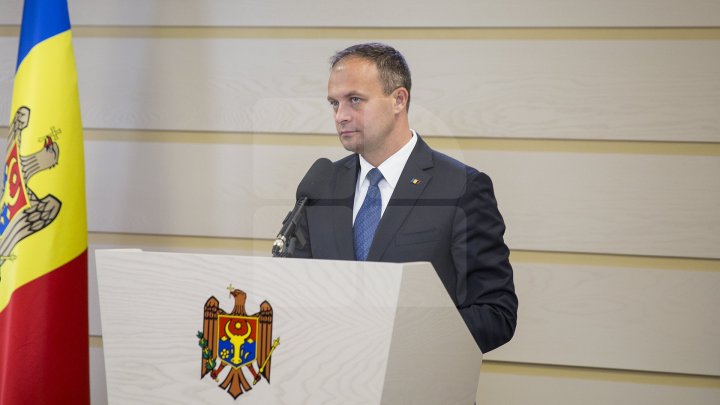Candu about report of Open Dialogue: This foundation is a scheme of FSB against Moldova, Poland and Ukraine
 foto: publika.md
foto: publika.md
The Open Dialog Foundation is a vehicle and scheme used by the Russian Federation's Secret Services against states such as the Baltic countries, Poland, Ukraine and the Republic of Moldova. The statement was made by the President of Parliament, Andrian Candu, after the report of the investigation into the interference of the Open Dialog Foundation in the domestic affairs of the country and the illegal financing of some parties was examined in the Legislature today.
"Things are quite serious, because, I am referring to what the committee found, this foundation registered in Poland, but which has as founders citizens including the Russian Federation, has its financing support from the Ministry of Defense of the Russian Federation, delivery of military equipment in the states involved in regional conflicts, off-shore payments with known dubious route and provenance, the money laundering scheme we referred to when talking about the Russian laundry and even sources of financing for bank fraud in the republic Moldova.
From the information provided by the commission, it was found that this foundation is a vehicle and a scheme used by the FSB Secret Service of Russia, against states such as the Baltic countries, Poland, Ukraine and the Republic of Moldova.
The people involved, including those in Crimea, Russian citizens, Kazakhstan, some fugitives, some in international search, some with lost files, are nothing but those who are part of the hybrid war fought by the Russian Federation against some states, including Moldova , said Andrian Candu.
At the same time, the head of the Legislature mentioned that, regretfully, this foundation attracted consciously or unconsciously, intentionally or imprudently, political persons from our country:
"These people like Maia Sandu, Andrei Nastase, or other exponents mentioned in the report were attracted by this foundation in the battles, including against the Republic of Moldova in the interests of Russia.
These actions, if intentional, presuppose the offense of betrayal by the state or the Republic of Moldova. The question is whether our politicians knew what they were doing against the country, they had the intention of harming, including the materials of the Republic of Moldova and the ecomic situation in the country, or they did it unknowingly. Regretfully, the Commission that worked in Parliament has had no opportunity to engage with these people and learn more. We are not talking about a ticket or hotel expenses here, we are not talking about that money, but we wanted to know what other circumstances they were doing with this foundation, what they were discussing, what information they were asked to clearly notes the full picture of the work of the Secret Services of Russia in Moldova ".
Andrian Candu explained why the report was discussed in plenary and closed doors.
"The report also had confidential information, which was why it took a moment to interrupt the plenary session for the public, then we went back to open discussions. The secret part discussed in plenary refers to the companies involved in financing, bank accounts, transferred money, and money laundering schemes.This information is currently under international investigation in several states.Of those who provided this information have asked us not to be publicly used because these investigations are still ongoing and will serve as evidence in files in these countries. I refer to companies involved in money laundering, money laundering, beneficiaries", said Candu.
According to the Speaker of the Parliament, the report will be sent to the Moldovan authorities, who will further investigate the case: the General Prosecutor's Office, the NAC, the SIS and the Money Laundering Service.
"On Monday, I will indicate that this report should be translated into English language and sent to the European Union, the Council of Europe, the OSCE, NATO and some states mentioned in the report: Poland, Ukraine, Romania, the Baltic States, USA because they are security related information including those countries", concluded Andrian Candu.
On Monday, the PAS and PPDA leaders again refused to attend the hearings of the parliamentary commission, which examines the involvement of the Open Dialogue Foundation in the country's domestic policy, as well as the funding of some parties. At the door of the Parliament, Maia Sandu and Andrei Nastase repeatedly called for the sitting to be public, although this contradicts the law, after which they turned back.
Although Maia Sandu and Andrei Nastase reject any direct connection with the Open Dialog Foundation, several photos have appeared in the online environment proving that the two had participated in at least two events organized with the support of this NGO, accused of lobbying for offenders threatening, dubious funding, and delivering military equipment to Donbass.
This summer, the head of the NGO, Ludmila Kozlovska, was expelled from the EU for connections with Russian special services. Recently, in Warsaw, delegates from several OSCE countries have accused the foundation of lobbying for dangerous criminals, benefiting from dubious funding and delivering military equipment to Donbass.
Zeppelin journalists have previously written that the Open Dialog Foundation, funded by controversial oligarch Muhtar Abliazov, has been lobbying in Europe for parties led by Maia Sandu and Andrei Nastase. In this scheme is also present the suspect Veaceslav Platon.